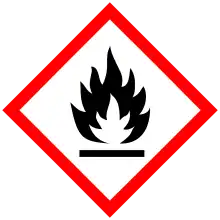_borate_molecule.png.webp) | |
| Names | |
|---|---|
| IUPAC name
Tris(2,2,2-trifluoroethyl) borate[1] | |
| Other names | |
| Identifiers | |
| ECHA InfoCard | 100.215.852 |
PubChem CID |
|
CompTox Dashboard (EPA) |
|
| Properties | |
| B(OCH2CF3)3 | |
| Molar mass | 307.91 g·mol−1 |
| Appearance | Colourless liquid |
| Density | 1.430 g/cm3[3] |
| Boiling point | 94.3 °C (201.7 °F; 367.4 K) |
Refractive index (nD) |
1.298[2] |
| Hazards | |
| Occupational safety and health (OHS/OSH): | |
Main hazards |
Flammable liquid and vapor[1] |
| GHS labelling: | |
 | |
| Warning | |
| H226 | |
| P210, P233, P240, P241, P242, P243, P280, P303+P361+P353, P370+P378, P403+P235, P501 | |
| Flash point | 43.3 °C (109.9 °F)[3] |
Except where otherwise noted, data are given for materials in their standard state (at 25 °C [77 °F], 100 kPa).
Infobox references | |
Tris(2,2,2-trifluoroethyl) borate, also commonly referred to as the Sheppard amidation reagent,[2] is a chemical compound with the formula B(OCH2CF3)3. This borate ester reagent is used in organic synthesis.
Preparation
Tris(2,2,2-trifluoroethyl) borate can be prepared by reaction of trifluoroethanol with boron trichloride, borane dimethylsulfide, boron tribromide, or boric anhydride. The latter is more convenient for larger scale preparations due to its low cost and ease of handling.[4]
- CF3CH2OH + B2O3 → B(OCH2CF3)3
The product is purified by distillation.
Applications
The reagent is mostly used in condensation reactions. It has been shown to promote the direct formation of amides[4][5][6][7] from carboxylic acids and amines as well as the formation of imines[8] from amines or amides with carbonyl compounds.
It has also been used for the coupling of unprotected amino acids with amines.[6][9]
It has also been shown to mediate formylation of amines, via transamidation of dimethylformamide.
It is a strong Lewis acid (acceptor number = 66, Gutmann-Beckett method).[10]
References
- 1 2 3 4 https://pubchem.ncbi.nlm.nih.gov/compound/3599767
- 1 2 3 4 5 "Tris(2,2,2-trifluoroethyl) borate 97% | Sigma-Aldrich". www.sigmaaldrich.com. Retrieved 2016-09-21.
- 1 2 https://www.sigmaaldrich.com/GB/en/sds/aldrich/790877
- 1 2 Lanigan, Rachel M.; Starkov, Pavel; Sheppard, Tom D. (2013-05-03). "Direct Synthesis of Amides from Carboxylic Acids and Amines Using B(OCH2CF3)3". The Journal of Organic Chemistry. 78 (9): 4512–4523. doi:10.1021/jo400509n. ISSN 0022-3263. PMC 3671500. PMID 23586467.
- ↑ Karaluka, Valerija; Lanigan, Rachel M.; Murray, Paul M.; Badland, Matthew; Sheppard, Tom D. (2015-11-03). "B(OCH2CF3)3-mediated direct amidation of pharmaceutically relevant building blocks in cyclopentyl methyl ether" (PDF). Organic & Biomolecular Chemistry. 13 (44): 10888–10894. doi:10.1039/C5OB01801C. ISSN 1477-0539. PMID 26366853.
- 1 2 Lanigan, Rachel M.; Karaluka, Valerija; Sabatini, Marco T.; Starkov, Pavel; Badland, Matthew; Boulton, Lee; Sheppard, Tom D. (2016-07-07). "Direct amidation of unprotected amino acids using B(OCH2CF3)3". Chemical Communications. 52 (57): 8846–8849. doi:10.1039/C6CC05147B. ISSN 1364-548X. PMID 27346362.
- ↑ Sabatini, Marco T.; Boulton, Lee T.; Sheppard, Tom D. (2017-09-01). "Borate esters: Simple catalysts for the sustainable synthesis of complex amides". Science Advances. 3 (9): e1701028. Bibcode:2017SciA....3E1028S. doi:10.1126/sciadv.1701028. ISSN 2375-2548. PMC 5609808. PMID 28948222.
- ↑ Reeves, Jonathan T.; Visco, Michael D.; Marsini, Maurice A.; Grinberg, Nelu; Busacca, Carl A.; Mattson, Anita E.; Senanayake, Chris H. (2015-05-15). "A General Method for Imine Formation Using B(OCH2CF3)3". Organic Letters. 17 (10): 2442–2445. doi:10.1021/acs.orglett.5b00949. ISSN 1523-7060. PMID 25906082.
- ↑ Sabatini, Marco; Karaluka, Valerija; Lanigan, Rachel; Boulton, Lee; Badland, Matthew; Sheppard, Tom David (2018). "Protecting-group-free amidation of amino acids using Lewis acid catalysts". Chemistry - A European Journal. 24 (27): 7033–7043. doi:10.1002/chem.201800372. ISSN 1521-3765. PMC 5969221. PMID 29505683.
- ↑ Beckett, Michael A; Rugen-Hankey Martin P; Strickland, Gary C; Varma, K. Sukumar, Lewis acidity in haloalkyl orthoborate and metaborate esters, (2001) Phosphorus, Sulfur, and Silicon, 168, 437-440.
Further reading
- Related reagent tris(2,2,2-trinitroethyl)borate: Klapötke, Thomas M.; Krumm, Burkhard; Rusan, Magdalena; Sabatini, Jesse J. (2014). "Improved green-light-emitting pyrotechnic formulations based on tris(2,2,2-trinitroethyl)borate and boron carbide". Chem. Commun. 50 (67): 9581–9583. doi:10.1039/c4cc04616a. PMID 25012058.